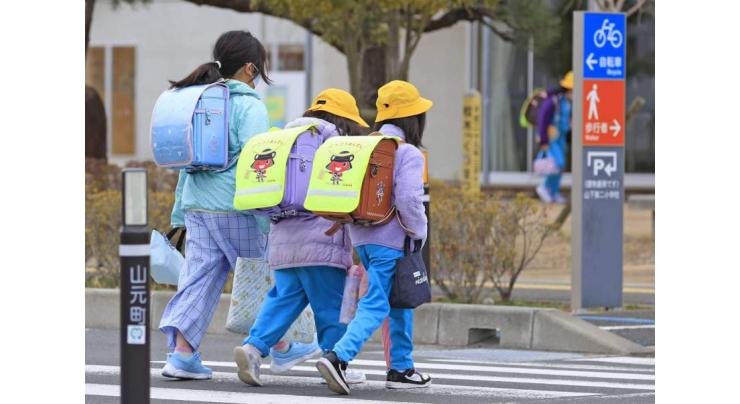
Child Population In Japan Drops To New Low After 42-Year Down Trend - Reports
Mohammad Ali (@ChaudhryMAli88) Published May 04, 2023 | 07:59 PM

The estimated child population in Japan has been on the decline for 42 consecutive years, reaching a new record low, Japanese media reported, citing government data
MOSCOW (UrduPoint News / Sputnik - 04th May, 2023) The estimated child population in Japan has been on the decline for 42 consecutive years, reaching a new record low, Japanese media reported, citing government data.
The number of children under 14 years old was estimated at 14.35 million as of April 1, which is about 300,000 fewer than in the same period last year, Japanese news agency Kyodo reported.
Children made up 11.5% of the country's population, the lowest figure since records began in 1950, the report said. Data shows that Japanese citizens generally prefer to have fewer and fewer kids, as there are currently about 3.21 million children between 12 and 14 years old, while the number of children under two is 2.43 million, Kyodo noted.
Japan's child population has been continuously on decline since 1982, while the two baby booms in the country's modern history occurred in 1954 and in the early 1970s, according to the report.
In October, all of Japan's 47 prefectures recorded a decrease in the birth rate, the report said.
The highest ratio of children, 16.3% of the population, has been recorded in the southern prefecture of Okinawa, while the lowest, 9.3%, has been recorded in Akita Prefecture in the north of the country, according to the report.
In 2022, Japan's birth rate fell below 800,000, which was a historic low and underlined the need for urgent measures. As a result, in April, Japan launched the Children and Families Agency, a new institution designed to tackle the country's demographic issues.
However, in February, Japanese Prime Minister Fumio Kishida announced an increase in child care budget, but the government downplayed the proposal, criticizing it for being too vague.
Related Topics
Recent Stories

PM arrives in Tehran on day-long visit to Iran

Imran Khan, Bushra Bibi bail pleas adjourned until June 4

Chief Minister Punjab Maryam Nawaz's performance in providing cheap essential go ..

Introducing Infinix GT 20 Pro: The Official Gaming Phone of the PUBG MOBILE Supe ..

Sea of people attend funeral of President Raisi in Tehran

T20 World Cup 2024: Pakistan to announce squad by tomorrow

Security forces kill 29 terrorists in Balochistan

President Raisi, FM Abdollahian funeral prayer offered

PM Shehbaz to visit Iran today

Currency Rate In Pakistan - Dollar, Euro, Pound, Riyal Rates On 22 May 2024

Today Gold Rate in Pakistan 22 May 2024

Serial winner Kroos eyes two-trophy finish to career
More Stories From World
-
Gilgit-Baltistan Assembly Passes Condolence Resolution on Iranian President's Death
2 minutes ago -
20 people in intensive care after turbulent Singapore Airlines flight
11 minutes ago -
Temu owner Pinduoduo says triples net profit in first quarter
12 minutes ago -
Pentagon says Russia launched space weapon in path of US satellite
21 minutes ago -
AI dominates annual Paris startup event VivaTech
22 minutes ago -
Nepal's 'Everest Man' claims record 30th summit
51 minutes ago
-
Saudi praises European countries' recognition of Palestinian state
51 minutes ago -
'Massive' fire at Danish pharma giant Novo Nordisk
51 minutes ago -
Liverpool's Doak given surprise call-up to Scotland's Euros squad
52 minutes ago -
Hamas, PLO welcome European Palestine recognition moves
1 hour ago -
President Zardari's remarks on One-China principle, highly appreciable: Wang Wenbin
2 hours ago -
US fund Oaktree 'assumes ownership' of Inter Milan
2 hours ago